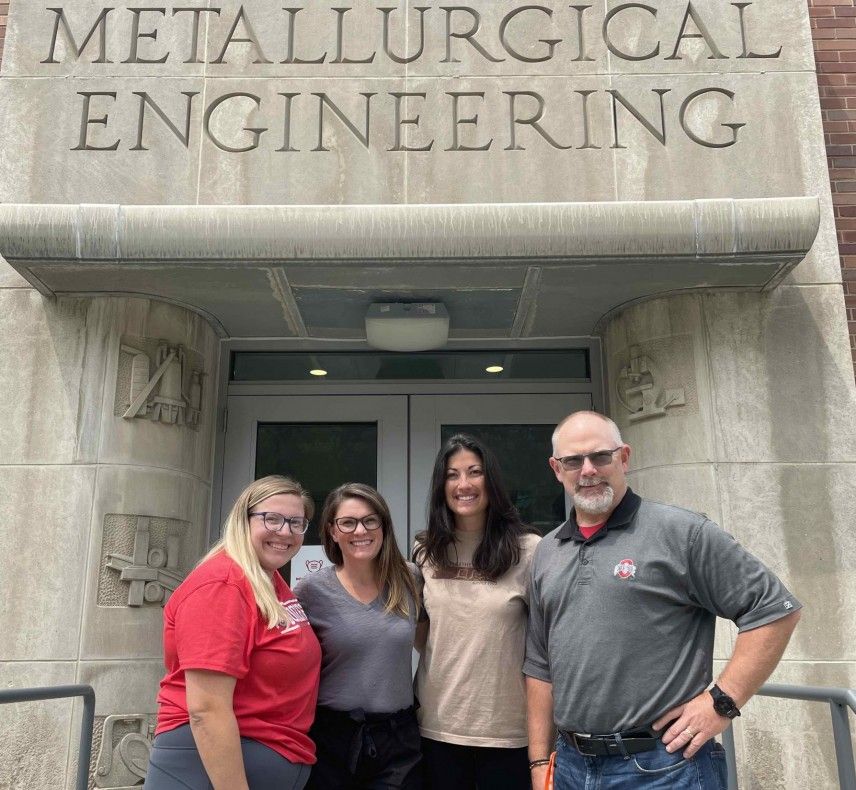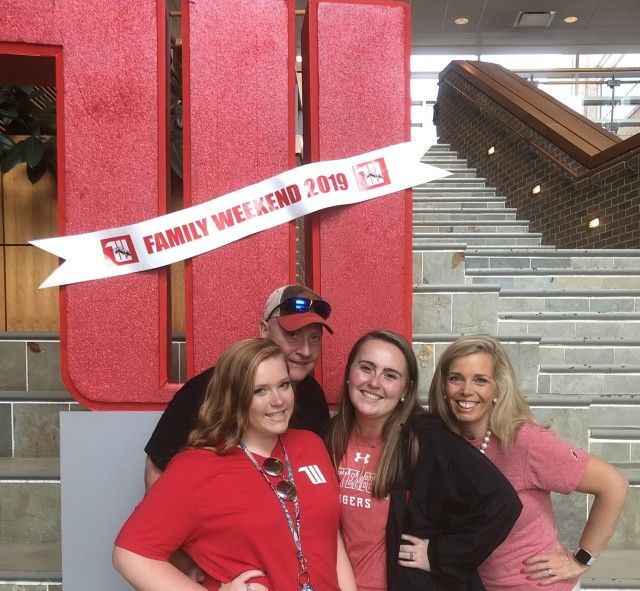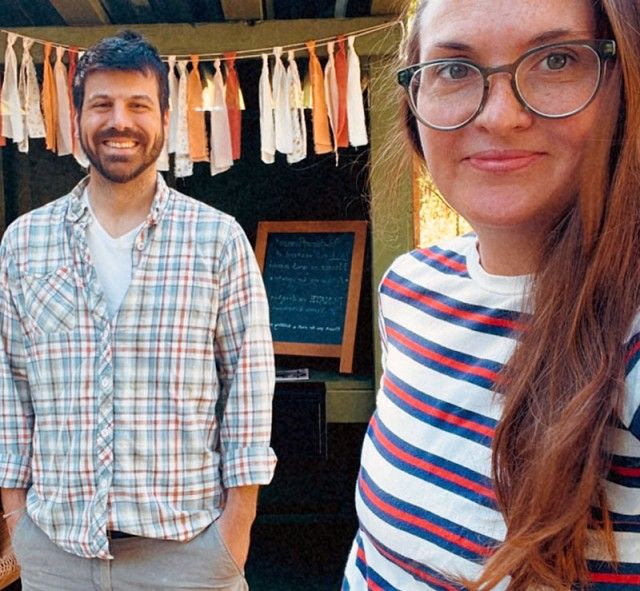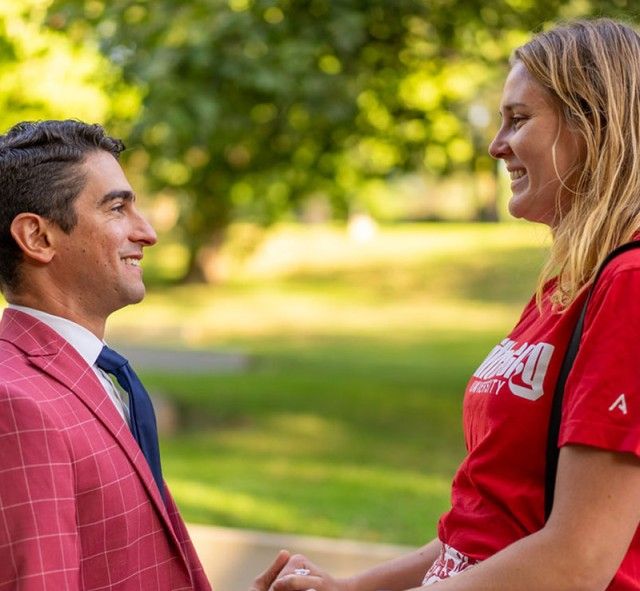Known as an introvert during her high school days, Jenifer Warner Locke, Wittenberg class of 2004, is thankful for her liberal arts education and credits the University for helping her break out of her shell and for growing into the wholistic intellectual individual she is today.
These days the physics major and math minor from Wittenberg has found the perfect mix of teaching, research, family, and service, as an assistant professor in the Department of Materials Science and Engineering at the Fontana Corrosion Center at The Ohio State University.
“I worked for a year at Wright-Patterson Air Force Base (WPAFB) in the materials and manufacturing area at AFRL (Air Force Research Lab) with metallic glasses. I saw the ability to make metals interesting, knew engineers and what they were doing, and it turned into a yearlong job that I really enjoyed doing, so I decided to go to grad school to learn more about it,” said Locke, originally from Massillon, Ohio.
She applied to University of Virginia in the summer of 2005 and finished her Ph.D. in materials science engineering in December of 2010.
“My research now is exactly the same theme as my graduate research, corrosion and environmental cracking,” she continued. “We researched why metals go through degradation due to corrosion, so I too, wanted to go into the sustainability field. I was interested in this field of study and how you mitigate the effect of the environment. Most metals don’t want to be metal so you have to find ways to keep them metallic in order to maintain long-term sustainable use. The research can be used for aircraft, automotive, and naval structures, depending on the needs.”
After grad school, Locke stayed on an extra year to help train new grad students in the program.
“I really enjoyed it,” she said. “I visited a lot of different, new places and attended numerous lectures and conferences during my time. I got to see a lot of different things. Then I took a job at Alcoa, an aluminum company in Pittsburgh. I worked there from 2011 to 2014 in the automotive and aerospace corrosion zone before taking the position at Ohio State.”
At Ohio State, Locke was awarded the National Science Foundation CAREER award. According to her research page on the Ohio State website, she, along with her team, are researching how the environment causes cracking and failure to be accelerated in aluminum-based alloys. The award will drive research and education on why certain aluminum-based alloys are more resistant to the environment-induced degradation than others, which can inform more sustainable use of these and other metals and prevent failure. Another rewarding aspect to the award is that it allows Locke to give back to her undergraduate institution.
Locke and her team perform environment-assisted cracking experiments on model alloys. During these experiments, the team uses an experimental technique developed in Locke’s lab under previous NSF funding to monitor the crack tip pH and correlate it to the resistance of each alloy type. The NSF CAREER funding will support a graduate student for five years, five years of REU (Research Experience of Undergraduates), and RET (Research Experience for Teachers) participants. Through the funding, she is partnering with Wittenberg’s Physics Department and Professor Elizabeth George to sponsor an undergraduate student from Wittenberg University in her lab every year.
“When I started writing my grant, I wanted something that would combine the research-funded faculty component with an educational component,” Locke said. “I had to think of something that brings together my research, the education, and still be inspiring at the same time. My husband and I were talking about it to help me discover what I wanted deep down, and I realized the only thing I couldn’t get at Wittenberg, because of its size, was what research looks like at a bigger school. So, I chose to include this experience into my plan and fund a Wittenberg undergraduate every year.”
And now through her grant at The Ohio State University, a Wittenberg student can apply to work in Locke’s lab each summer. The first Wittenberg student to apply was physics major Lizzy Cefaratti, Wittenberg class of 2022 from Lebanon, Ohio, who spent her summer interning as a research assistant under Locke.
“Lizzy is learning all about materials and materials science and will continue to work with us,” Locke said. “I have a grad student, an undergrad, and a high school teacher – Scott Spohler from the STEM school in Springfield – working together as part of this particular grant. My grad student Gabby Montiel is from the University of Florida, where she earned her bachelor’s degree. She continues her Ph.D. work with both Lizzy and Scott. In addition to research, they made a classroom demo for Scott to take back and use for class.”
Locke, who was a member of the Society of Physics students, was involved in theatre, served as a Math Workshop tutor, and was a member of the Kappa Delta sorority during her time at Wittenberg, is thrilled to be working with Wittenberg as she cherishes her time at the University.
“I got lost in the crowds at the big schools – so I wanted to go someplace smaller,” she said. “I loved my time at Witt. I have really fond memories of Wittenberg. I like the fact that I have a liberal arts education. My classes were fun, and I try to make my classes fun for others. I learned that writing is massively valuable, and I talk to students about how important writing is all the time. I feel like Witt made me a more well-rounded individual. And it’s interesting how I still find myself on a stage doing lectures, even in grad school it was that way, making my theatre experience very valuable. Oral and written communication education at Witt paid off in spades. Obtaining a liberal arts education sets me apart from others.”
Locke currently resides in Dublin, Ohio, with husband, Landon, also a 2004 Wittenberg graduate, and their children Clara, age 6, and Oliver, age 3.
Pictured from left to right in the photo above are: Lizzy Cefaratti ’22, Jenifer Locke ’04, Gabby Montiel, and Scott Spohler.







